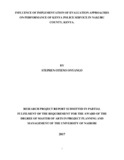Influence of Implementation of Evaluation Approaches on Performance of Kenya Police Service in Nakuru County, Kenya.

View/
Date
2017Author
Onyango, Stephen O
Type
ThesisLanguage
enMetadata
Show full item recordAbstract
Evaluation is a tool for performance enhancement and many organizations are adopting a results based management as a form of improving organizations output .This study examined the influence of implementation of evaluation approaches on police performance. The police reforms program document (2015-2018) sets the first mid-term evaluation to be conducted in December, 2016 but prior to that evaluation of police performance was continuous process done with key stakeholders using different approaches. The objective of the study was to assess the influence of evaluation approaches on performance of Kenya police service in Nakuru County, Kenya; the main approaches under study being , goal oriented approach, management oriented approach, customer oriented approach and expert oriented approach on the performance of Kenya police service in Nakuru County. The study adopted a descriptive research design and the target population was 1150 Kenya police officers within Nakuru County. A sample of 345 respondents was drawn from the population using stratified sampling with simple random and purposive sampling techniques in which a total of 283 responses were received from Police officers and 21 from key informants. 10 key informants were drawn from County Community policing committee, 5 from Monitoring and inspection Unit of Independent policing Oversight Authority, 5 from Police Reforms Directorate, 3 from Kenya national Commission on Human Rights and 4 from National Police Service Commission. Secondary data was retrieved from Kenya police annual reports, Nakuru county police annual reports, Ransley report , IPOA reports , United nations Rapporteur report on extra judicial killings, Police strategic Plan 2003-2007 and police reforms programme document 2015-2018 and the contents was analyzed. Data collection was done using questionnaire and scrutinized to eliminate questionnaires with errors to ensure reliability, and the key informants were interviewed. Reliability test was done using split half technique where spearman‟s brown reliability coefficient was .81. Data analysis was conducted with the aid of statistical package for Social Sciences (version20) to record frequencies, percentages and spearman‟s rank correlation coefficient. Likewise, Qualitative data retrieved from key informants provided insight on the various evaluation approaches. The findings revealed that implementation of goal oriented approach to evaluation and police performance had a moderate positive correlation with a coefficient r=0.499, implementation of management role in evaluation had a low positive correlation with police performance with a coefficient r=0.246 ., Implementation of customers oriented approach to evaluation had strong positive correlation with police performance with a coefficient r=0.562 , hence the greatest positive influence on police performance . Implementation of experts oriented approach to evaluation had low positive correlation with police performance with a coefficient r= 0.068. The study recommended that an audit and enhancement of police management training, police officers should be treated as internal customers and emphasis should be given to their needs the same way emphasis is placed on performance aspects that focus on security needs of members of the public, The evaluation functions of IPOA, NPSC, IAU in regards to police accountability should be decentralized a long police administrative structures.
Publisher
University of Nairobi
Rights
Attribution-NonCommercial-NoDerivs 3.0 United StatesUsage Rights
http://creativecommons.org/licenses/by-nc-nd/3.0/us/Collections
- Faculty of Education (FEd) [6022]
The following license files are associated with this item:

